
India Construction Festival - 2019
Last year, infrastructure think tank FIRST Construction Council (FCC) approached the Ministry of Commerce, Government of India, with a loud and clear premise: To create a much simpler environment for companies to set up their base and operate in India. And what began as a small discussion evolved into what is popularly known as the India Construction Festival (ICF).
Celebrating construction
The India Construction Festival, organised by FCC on October 15-16, 2019, comprised four sub-events: The India Roads Conference; the CONSTRUCTION WORLD Global Awards; the CW-ENR Leadership Summit; and the 亚洲无码 Awards.
FY2019 was a challenging time for India Inc. The issues were many, ranging from liquidity crunch, rising bad loans, loan defaults (principal as well as interest), slowing capex and slower automobile growth to delayed or stalled projects, financially inviable projects and an insolvency-like situation for a few large organisations. Despite all the obstacles, uncertainties and challenges, a few entities managed to persevere and prevail, posting growth and exhibiting excellence. And many of these companies, from the universe of construction, contracting, engineering and building materials, were honoured for their outstanding work at the ICF in Delhi. Also, for the second consecutive year, CONSTRUCTION WORLD associated with New York-based Engineering News-Record, popularly known as ENR, the world's oldest and largest circulated engineering magazine, to recognise the top international design and contracting firms.
From the stalwarts... 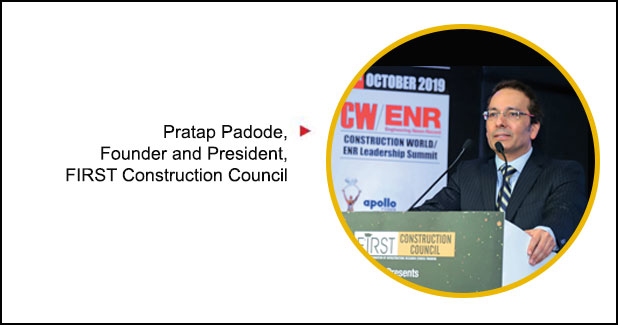
Delivering the inaugural address at the India Construction Festival, Pratap Padode, Founder & President, FIRST Construction Council, said, "The Indian construction industry is not only one of the fastest growing sectors but will continue to invite new investments. And, India will have to explore new turf to enhance investments in infrastructure. The country needs a strong pipeline to attract leading global engineering firms. Lack of funding continues to be the principal impediment in the way of completion of infrastructure projects." While he laid emphasis on the need to examine ways in which technology can be leveraged to improve the Indian construction industry, Padode went on to add, "FCC will share an extensive report with the National Highways Authority of India (NHAI) on proposed resolutions of impediments based on suggestions received from stakeholders at ICF."
The India Roads Conference was inaugurated by event guest and keynote speaker Nagendra Nath Sinha, Chairman, NHAI. In his address to the audience, which kicked off the conference perfectly, Sinha said, "The highways sector will contribute significantly to robust infrastructure development. We are looking at financial returns before making investments in road and highway projects, and rationalising land requirements in future projects. In order to squeeze more out of highways, the government has decided on 100 per cent electronic tolling. Also, MoRTH and NHAI will work with eight state governments on "One Nation, One (RFID) Tag" to enhance toll collection on highways. Further, owing to its success, NHAI will continue with the HAM model." The guest of honour at the CW-ENR Leadership Summit was Dr Anup Wadhawan, Secretary, Ministry of Commerce & Industry, Government of India. He said, "There is a need to introspect upon the reasons behind construction projects being stuck and misusing investor money." He emphasised upon the need for the Indian construction industry to set higher standards to be recognised globally.
For his part, Steve Jones, Senior Director, Industry Insights Research, Dodge Data & Analytics, said, "The construction industry is at one of the most remarkable points in its history." He said, "BIM can help reduce rework; project modelling helps consolidate costs into a single source; laser scanning is an effective way of exploring equipment access; and 3D printing of structures is the future of construction."
Awards and recognition At its core, the ICF was a celebration of victory, with an audience of about 800. Over 60 awards and honours were conferred upon leading construction companies, global design and engineering firms and building materials and equipment companies.
From top government officials and regulators to captains of the construction industry, the overarching sentiment was one of positivity and optimism. What's more, the event was the perfect opportunity for the construction fraternity to network ensuring that everyone was a winner!
Infrastructure will play a significant role in the country's march towards its $5 trillion dream. Consequently, the development of highways, rail and metro-rail, ports and shipping, warehousing and logistics, airports and mining has experienced brisk activity. Besides, attempts have been made to make critical sectors like steel globally competitive through policy interventions.
Having said that, policy interventions can only serve to change the sentiment to positive briefly. What makes the real difference is "reform". Land acquisition for infrastructure projects continues to remain a serious challenge and perhaps it is time policymakers took a relook at the Land Acquisition Act, 2013. Land pooling and experiments on making landowners stakeholders in infra projects have been successfully implemented in Navi Mumbai, Pune and Andhra Pradesh. There are lessons and solutions. Considering the high cost of land, such out-of-the-box solutions are worth exploring further.
Fundraising is another issue. Other than government spending, a sign of a robust free-market economy is private spending.
And that needs to be revived. Also, the divestment of PSUs needs to be accelerated to unlock value in several such assets. Last but not least, it is pertinent to have a workforce that is suitably trained to take on the challenges of Industry 4.0. FIRST Construction Council will share an extensive report with NHAI on proposed resolutions of impediments based on suggestions received from stakeholders at the India Construction Festival.
Pratap Padode, Founder & President, FIRST Construction Council, addressing the audience at the inaugural session of the India Roads Conference 2019.
India's transport departments and ministries are structured in a way that they are operating in silos. We need to come and work together, and make the most efficient and effective investment for the economy.
The industry and associated sectors should undergo a change, where we not only look at roads but also shipping, aviation, railways, metro and all other transport sectors - so that we are addressing transport needs together rather than individually.
Currently, we are planning Rs 14 trillion worth of investment in the next five years. The primary vehicle for this level of investment is the Bharatmala programme, which looks at the economic corridors - 44 corridors have been identified - internal corridor connectivity, feeder roads, port of connectivity, and international connectivity.
ICF would go a long way in getting ideas that help the sector grow. NHAI has always been receptive to new ideas and certainly these ideas are well-articulated, and we will welcome the industry's needs and support them. Hopefully, next year onwards, we should see much better and higher economic growth and the infrastructure sector playing a larger role in accelerating the economy.
Chief Guest NN Sinha, Chairman, NHAI, addressing the audience at the 7th India Roads Conference 2019.
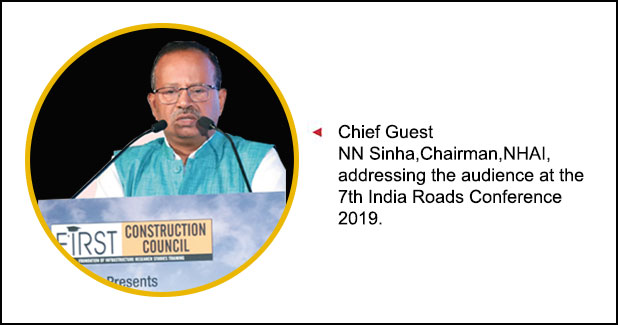
When I took over at the coal ministry, everyone thought that scams were a problem. And two scams had already broken out. When I analysed it, I realised that scams were just a symptom of a much deeper problem. We discovered that the primary problem of coal scams was shortage of coal. So for getting coal, there are three important ingredients: Availability of land, environment and forest clearance, and evacuation of coal.
Sometimes, the government does not analyse the problem to identify where the problem is. There is a wrong perception that everyone in the construction industry is dishonest. So, how will it be corrected? My advice to the government is to set up an empowered group that goes into the detail of each project to identify whether the problem is with the promoter. So, for instance, if the government does not give the environmental clearance or provide land, how do you hold the construction industry responsible for constructing that road? But, there could be a case that the government has provided these clearances and the land, and the contractor does not construct for whatever reasons; but this can happen only if you go into the details of it.
When I was heading the Project Monitoring Group (PMG), we were trying to fast-track projects worth Rs 10 billion, and it did happen. In UPA, too, we did manage to clear projects worth Rs 5 trillion in 15 months. The PMG still exists. How about creating institutional track platforms to re-establish the communication between the one who has the problem and the one who is creating the problem? Sometimes, it can be magical.
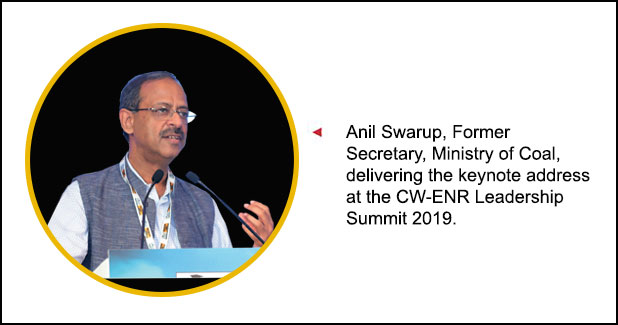
India is a $2.7-trillion economy and the construction sector is worth $400 billion, which is a significant size, and has root linkages to other sectors. In a way, it is a sector that leads the economy to growth or rides it into recession; its importance cannot be overemphasised. It is difficult to set the goals our economy has; it has a critical linkage with the use of resources and critical linkage with conservation of resources. And, the issues of recycling and reuse of materials are all pervading, which are linked with the construction industry. These goals can be achieved for improving the construction sector's practices.
I would urge some element of introspection in whatever we do. This plus, the quality of construction and timeline also need to be checked on. Clearly, we need to adopt and implement guidelines of global standards, where there is quality and timeline of construction and quality of materials, whether it is construction technology such as prefab or offsite. This is important for getting value for money.
You, the industry, need to come together and set some standards for yourself, try to develop a reputation. I urge the industry to have such sort of a monitoring mechanism or rating entities, so that we create a sense of competition to provide some guidance to the client for making choices. Then you incentivise the entities to improve their reputation and improve their ratings.
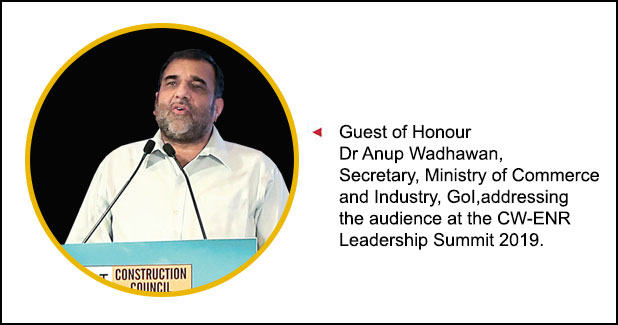
Some techniques will continue to be interesting innovations: One is using site camera. You can also look for safety. Next, reality captured laser scanning, photo-grammetry, IR is a good way to capture existing conditions. Projects can be completed on time, on budget and with good safety records. Then there is the Internet of Things - which involves the use of sensors. Companies are using sensors for concrete curing; the sensors tell them exactly when it is cured. Next is 3D printing -Europe is 3D printing structural components for bridges and this is done with concrete. What is also most exciting in Europe is that structural strength steel is being created and printed based on exactly what the model asks it to do.
This is the exciting future for 3D printing in our business. The last idea is that of digital twinning.
The more we capture with modelling and scanning, the more we have the GPS type information, and we put these together to build the virtual existing conditions that we have. This should be done at the start of a project. This is our digital future for this industry.
Steve Jones, Senior Director, Industry Insights Research, Dodge Data & Analytics, addressing the audience.
INDIA ROADS CONFERENCE
SESSION 1: Roads - The Uphill Tasks: Tunnels, Mountainous Terrains & Bridges 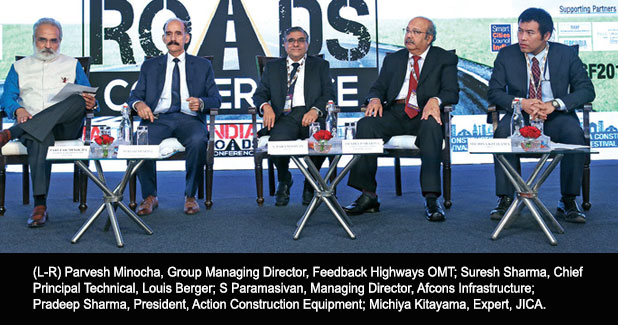
SESSION 2: Raising Roadblocks, Raising Funds
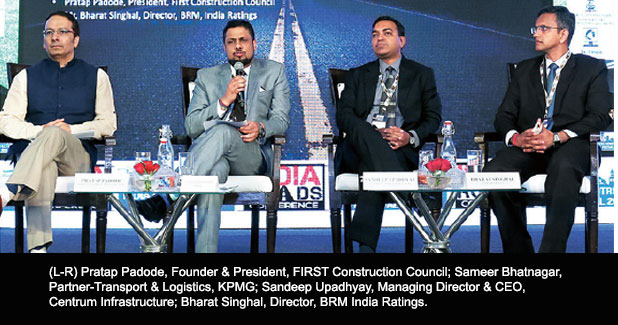
SESSION 3: Challenges to Connectivity:
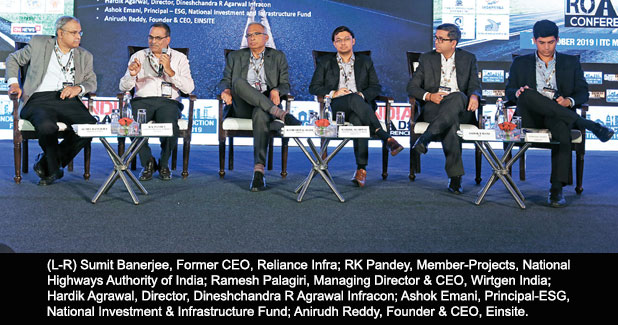
INDIA ROADS CONFERENCE
Gold Partners: Larsen & Toubro; Dilip Buildcon; APCO Infratech; Welspun Group and Afcons Infrastructure.
Silver Partner: Dineshchandra R Agrawal Infracon. Associate Partners: Gayatri Projects; J Kumar Infraprojects; Action Construction Equipment; and Shyam Steel
CW-ENR LEADERSHIP SUMMIT: MISSION INNOVATION
SESSION 1: Tech Infiltration in Construction:
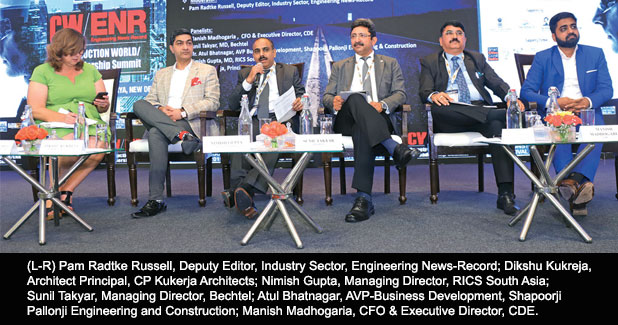
SESSION 2: Policy: Panacea or Peril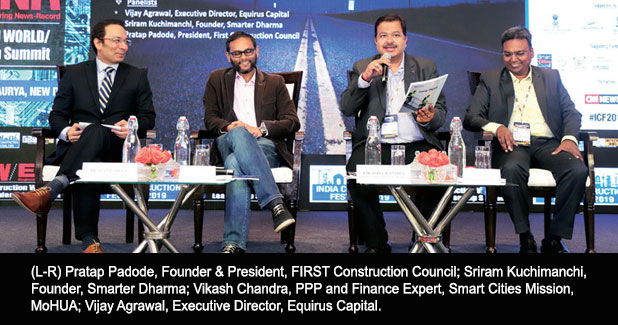
SESSION 3: Skill vs. Goals: Does Your Economy Have the Skill to Match Domestic and Overseas Development Targets?:
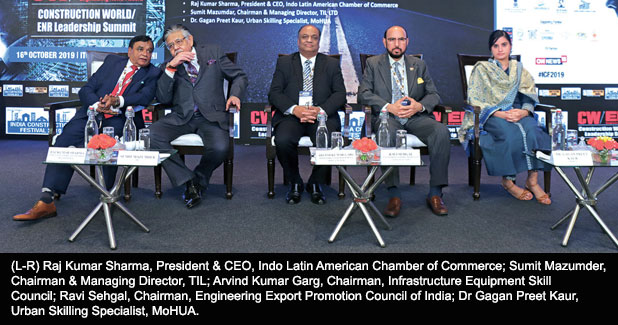
Gold Partners: Larsen & Toubro; Dilip Buildcon; Afcons Infrastructure; and CDE. ? Silver Partner: Turner.
Associate Partners: SANY; J Kumar Infraprojects; and Welspun Group.
 +91-22-24193000
+91-22-24193000 Subscriber@ASAPPinfoGlobal.com
Subscriber@ASAPPinfoGlobal.com